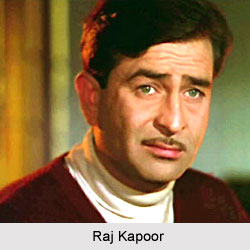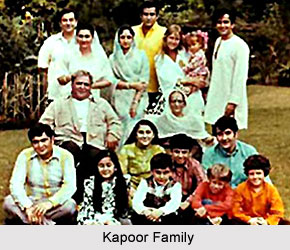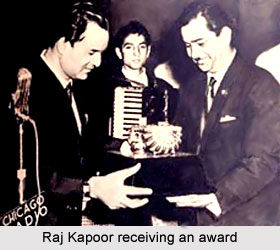 Raj Kapoor is considered one of the greatest personlaities in the history of Hindi film industry. There was hardly any area of film making that Raj Kapoor had not ventured into. He was a producer, a director, an actor, an editor, a musician and above all fantastic story- teller that Bollywood ever produced. His films portrayed the anguish of the common man through gloomy landscapes and sets with sharply contrasted lights. One of the persistent images that one gets to see in his films is that of a vagabond and the mongrel sitting together on the pavement in utter dejection, both thrown out from the highways where the upper class rules.
Raj Kapoor is considered one of the greatest personlaities in the history of Hindi film industry. There was hardly any area of film making that Raj Kapoor had not ventured into. He was a producer, a director, an actor, an editor, a musician and above all fantastic story- teller that Bollywood ever produced. His films portrayed the anguish of the common man through gloomy landscapes and sets with sharply contrasted lights. One of the persistent images that one gets to see in his films is that of a vagabond and the mongrel sitting together on the pavement in utter dejection, both thrown out from the highways where the upper class rules.
Early Life of Raj Kapoor
Raj Kapoor was born on 14th December 1924, in Peshawar in the North West Frontier Province of what is now Pakistan. He was named Ranbirraj Kapoor at birth, and was the eldest of the four children of well-known theatre and cinema actor Prithviraj Kapoor and his wife Smt. Ramsarni Devi. His younger brothers were the actors Shammi Kapoor and Shashi Kapoor. He also had a sister named Urmila Sial.
Career of Raj Kapoor
Raj Kapoor started his work as general factotum for Bombay Talkies before moving on to assist Kidar Sharma. Kidar Sharma gave Raj Kapoor his big break as a lead actor in 1947 with Neel Kamal opposite Madhubala. Earlier, at the age of 11, Raj Kapoor had appeared in a film called Inquilab. In 1948, at the age of 23, Raj Kapoor made his directorial debut with Aag, the first film under the RK banner. Aag disputed the traditional conventions of sympathetic characters and straightforward storytelling. It was also one of the first films of Raj Kapoor to explore duality - physical beauty on one hand and inner beauty on the other.

Mehboob`s Andaaz (1949) made Raj a top star and in the same year it was the passionate romance Barsaat which established Raj Kapoor as a meritorious director. Raj Kapoor had a great musical aptitude and always ensured that the songs were of the best quality. The 50s saw Raj Kapoor`s greatest work as a Producer-Director besides establishing himself as one of India`s biggest ever film stars along with Dev Anand and Dilip Kumar.
Awaara (1951), the tale of a vagabond was perhaps his greatest achievement. In Awara, Raj Kapoor gave a new meaning to the tramp by making him a representative of the innocent post-independent Indian. In fact many of his other films, Anari (1959), for example, look at the inexperienced simple hero exploited by a cruel and ruthless society. After Chori Chori (1956) and Jagte Raho (1956), Raj Kapoor continued to explore social issues - Jis Desh Mein Ganga Behti Hai (1960) - or complex human relationships - Sangam (1964).
In 1970, Kapoor made his masterwork Mera Naam Joker (1970) about a clown who makes others smile by hiding his tears, but the film fared very badly at the box office. He soared to the limelight with Bobby (1973) a teenage romance of young lovers fighting parental antagonism.
Satyam Shivam Sundaram (1978) was a failure but, Prem Rog (1982) based on widow re-marriage, and his last films Ram Teri Ganga Maili (1985), about innocence being sullied, were critical and commercial successes.
Awards and Recognitions of Raj Kapoor
1956 - Nominated Best Actor for Jagte Raho
1958 - Nominated Best Actor for Phir Subhah Hogi
1959 - Winner Best Actor for Anari
1961 - Winner Best Actor for Jis Desh Mein Ganga Behti Hai
1964 - Nominated Best Movie for Sangam
1964 - Winner Best Director for Sangam
1964 - Nominated Best Actor for Sangam
1971 - Nominated Best Movie for Mera Naam Joker
1971 - Winner Best Director for Mera Naam Joker
1973 - Nominated Best Movie for Bobby
1973 - Nominated Best Director for Bobby
1978 - Nominated Best Director for Satyam Shivam Sundaram
1980 - Nominated Best Supporting Actor for Abdullah
1982 - Winner Best Director for Prem Rog
1985 - Winner Best Director for Ram Teri Ganga Maili
1985 - Winner Best Movie for Ram Teri Ganga Maili
 Awards Received by Raj Kapoor
Awards Received by Raj Kapoor
Raj Kapoor had been bestowed with a National Award for cinematography for contribution to Indian cinema. In 1971, he was honoured with the Padma Bhushan, India`s third highest national award from the Government of India. In 1987, he was awarded the Dadasaheb Phalke Award, India`s highest award for cinematic distinction. On January 8, 2001, he was honoured with the "Best Director of the Millennium" award by Hero Honda-Stardust. In 2002, he was named "Showman of the Millennium" by Star Screen Awards.
International Honours and Recognitions of Raj Kapoor
Raj Kapoor was nominated for the 1953 Grand Prix award at the Cannes Film Festival for Awaara. A Raj Kapoor Film Festival was held on his 75th Birth Anniversary at the Cultural Centre of Russia on 17th January, 2000. The 55th Cannes International Film Festival, which was held from May 16-26, 2002, included a Raj Kapoor Retrospective as a mark of respect to the showman.
Raj Kapoor always retained a romantic optimism in his films. The conflict of Raj Kapoor`s films always concluded in a scenario where, as he maintains, all is well, everybody is happy and God is great. All happens within the existing social setup. Kapoor`s philosophy was basically based on love.
Personal Life of Raj Kapoor
In 1946, at the age of twenty-two, Raj Kapoor married Krishna Malhotra belonging to Jabalpur. They had three sons (Randhir Kapoor, Rishi Kapoor and Rajiv Kapoor) and two daughters (Ritu and Reema).
This veteran personality died in 1988 at the age of 63, from complications related to asthma.






